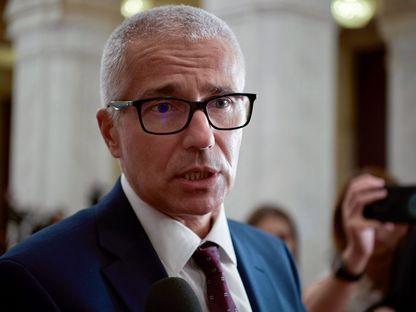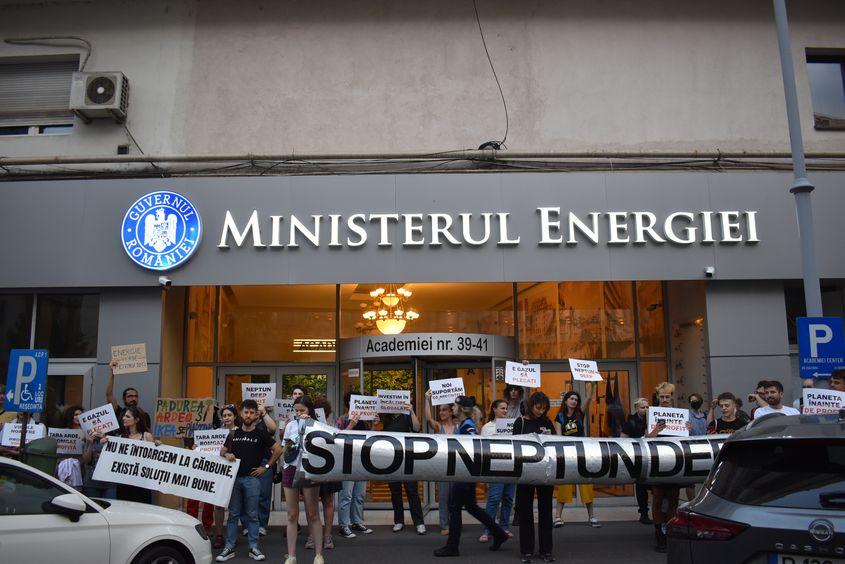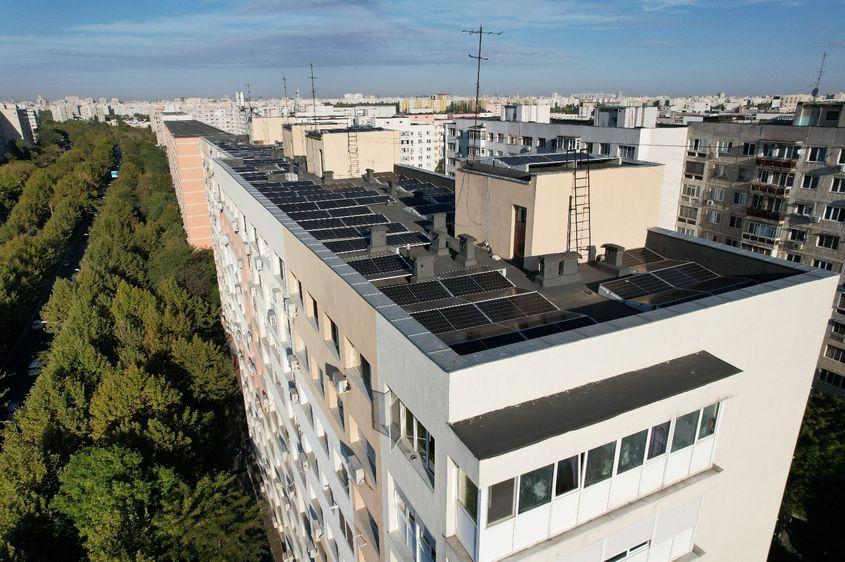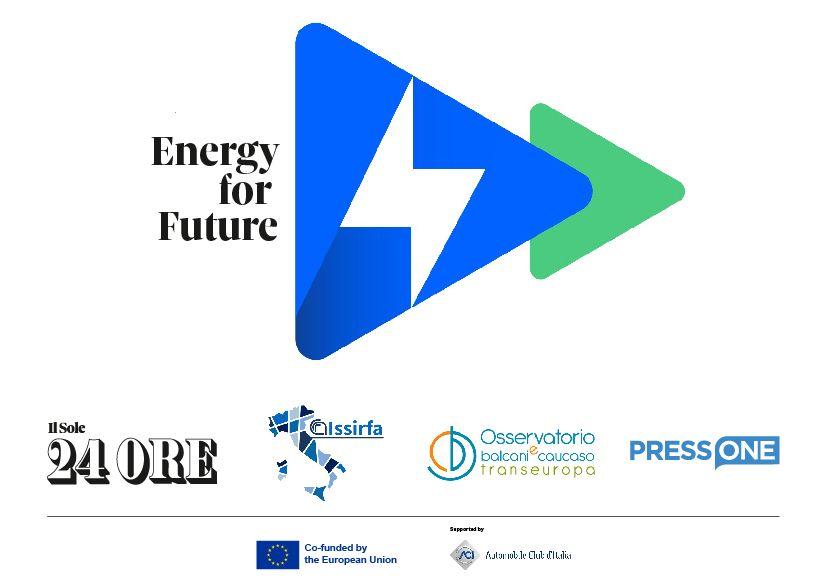One of the main streets of Sfântu Gheorghe, Danube Delta. The commune's mayor, Valentin Sidorencu, once wanted to build a photovoltaic panel park on a pasture 7 km from the village, where there was nothing. The authorities banned this on the grounds that it would change the image of the Danube Delta. But they allowed the billboards to be placed on houses. Photo: Andreea Câmpeanu
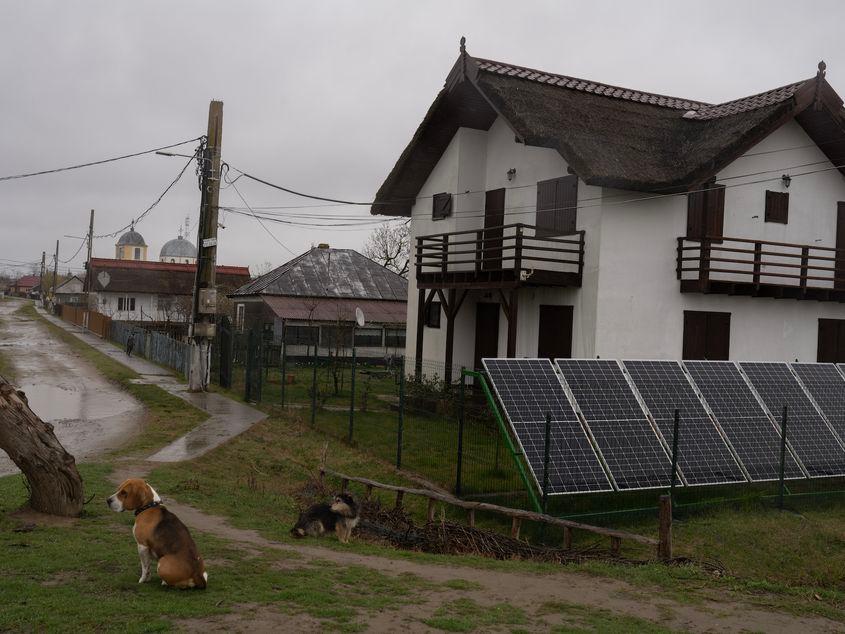
One of the main streets of Sfântu Gheorghe, Danube Delta. The commune's mayor, Valentin Sidorencu, once wanted to build a photovoltaic panel park on a pasture 7 km from the village, where there was nothing. The authorities banned this on the grounds that it would change the image of the Danube Delta. But they allowed the billboards to be placed on houses. Photo: Andreea Câmpeanu
18/07/2024
The Interests Behind a Law That Appeared Overnight. Huge Costs For Prosumers, Who Are Forced by the State To Shell Out Thousands of Euros
Around 99% of existing prosumers will have to buy storage batteries and change their electrical installation if a law passed by the Chamber of Deputies is enacted by President Klaus Iohannis. The cost could run up to €6,000.
UPDATE: President Klaus Iohannis has sent back to Parliament, for reconsideration, the law that required existing and future prosumers to install storage batteries for their photovoltaic systems.
In the last sitting of this parliamentary session, the Chamber of Deputies, as the decision-making body, voted, in fast-forward, a law obliging existing and future prosumers to install storage batteries. Otherwise, the amount of energy that prosumers will be able to feed into the grid will in most cases be halved. The proposal is currently with President Klaus Iohannis for promulgation.
- The law, which is based on an amendment tabled by the PSD group to another emergency ordinance, is being harshly criticized by prosumers' associations, which say the state has legislated that it "doesn't need prosumers' energy."
- The legislative act is applied retroactively. Furthermore, critics of the normative act claim that the law also violates two European directives.
- What will the future investment look like? A simple example: if a consumer has installed a 6 kW photovoltaic system for which he paid around €6,000, he will now have to pay around €6,000 more for storage, experts consulted by PressOne estimate.
- The cost of the investment will be borne out of the prosumer's pocket and is not just the price of the batteries. Most of those with photovoltaic panels will also have to buy new inverters, since existing equipment does not allow batteries to be fitted.
- What's more, those who became prosumers until last year through the "Photovoltaic Green House" program, financed through the Environmental Fund Administration, are not allowed to intervene on the system until 2029. Automatically, therefore, their grid feed-in power will be reduced.
Several associations of green energy producers have urged President Klaus Iohannis not to promulgate the draft law no. 255/2024, which would oblige prosumers to install storage batteries. Dumitru Luță, vice-president of the Association of Small Electricity Producers in Romania (AMPEER), believes that the obligation to store batteries should be incumbent on distribution companies, not prosumers.
"Batteries are very expensive. They were even more expensive. AMPEER disagrees with the imposition of the battery, regardless of which group the prosumer belongs to. If the Romanian state wants to do it, it should do it on the distributors' skin," Dumitru Luță says.
According to him, someone who has invested €6,000 in a 6 KW photovoltaic system should now invest that much more in storage.
The Association of Consumers and Energy Communities has also taken a stance against the bill on the imposition of batteries on prosumers. Moreover, they have also sent two petitions to President Klaus Iohannis asking for the law to be sent to Parliament for reconsideration.
According to the stenograms published by Hotnews, the MEPs from the Committee on Budget, Finance and Banks, who were present at the meeting where the bill was voted on, did not quite understand what and how they were voting. Nevertheless, the bill passed with only one abstention.
PressOne spoke to Dan Pîrșan, president of the Association of Energy Consumers and Communities about what it would mean for those they represent to be required to install batteries, given that the law would affect the overwhelming majority of existing prosumers.
Mulți ne citesc, puțini ne susțin. Fără ajutorul tău, nu putem continua să scriem astfel de articole. Cu doar 5 euro pe lună ne poți ajuta mai mult decât crezi și poți face diferența chiar acum!
PressOne: From your perspective, how did the amendment requiring prosumers to install storage batteries in PV installations come about?
Dan Pîrșan, PACE: It's Bill 255 for the approval of GEO 32 of the Ministry of Energy on the repeal of the "sun tax". So they stuck themselves with this amendment to abolish the sun tax, which whistled through several committees, where it was voted in ignorance.
The initiative came from Alfred Simonis, who is the spokesman for ACUE, the Federation of Energy Producers, Suppliers and Distributors, which in turn commissioned a study from the Faculty of Energetics at the Bucharest Polytechnic, in order to have some legitimacy.
Instead, the ordinance became law the very same day. Basically, fast forward. It seems to be a PSD habit to vote this way, the same way they did with the 2022 sun tax, which was voted before the Christmas break. It was lightning how they did it.
The law applies retroactively, and that means all prosumers will have to have batteries fitted. How have the prosumers you represent received the decision?
THE JUSTICE MINISTER’S PLAGIARIZED DOCTORATE. 140 pages of copied content in Radu Marinescu’s thesis
More than half of Justice Minister Radu Marinescu’s PhD thesis in Law is plagiarized. According to PressOne’s analysis, at least 56.68% of the pages of the work titled The System of Means of Evidence in Civil Proceedings contain text copied from other authors — specifically 140 pages out of the thesis’s 247 pages.
Predator in Robes: The Diocese of Iași and the Vatican Buried a Sexual Assault Committed by a Catholic Priest Against a Minor in Bacău, Failing to Alert Prosecutors
A Roman Catholic priest abused a 13-year-old girl in the parish where he served in Bacău County: the bishop of Iași knew about it, sent the case to the Vatican, and applied canonical sanctions, but did not notify the authorities, who only intervened later and sentenced him to prison.
We are appalled by the way this has been done. We challenged the law through a petition, in which we presented concrete elements: two European directives and guidelines have been violated and, in particular, two national laws, the law on transparency in decision-making and the law on public-private partnerships.
On the other hand, although the ACUE Association may have commissioned the study from Politehnica Bucharest, the Faculty of Energetics, it seems to have been carried out by a repeating student, because the document contains a number of confusions and ambiguities. We do not expect Romanian parliamentarians to have a profound knowledge of energy, but we do expect this from the Committee on Industry and Services, for example.
Un newsletter pentru cititori curioși și inteligenți.
Sunt curios
How many prosumers will be affected by the new law?
In our opinion, around 140,000. The law applies from 3 kW single-phase up to 10.8 single-phase and from 10.8 three-phase up to 400. So the law only exempts three-phase prosumers from 3 to 10.8 kW. And I'm not saying you can count them on your fingers, but that's no more than 500 prosumers out of the 140-something thousand we have now. So basically 99%. That's an overwhelming percentage.
But what would the investment in batteries mean for someone who already has panels installed?
Enormous. Most prosumers have been forced to install on-grid PV systems and feed the surplus into the grid. And these systems have specialized on-grid inverters, which now have to be thrown away. Consumers have to buy hybrid inverters. That's for single-phase consumers. For three-phase, it's even sadder. They can keep their current inverter, but they have to buy three other inverters in the back for each phase. Plus, all sorts of battery automation will be needed.
I am saying that for prosumers who have paid out of their own pocket or borrowed from the bank, the investment at present is double. Now they are left with just the panels that produce energy on the house, after which the whole system has to be changed. Plus batteries. And that out of their own pocket.
There are also those who installed their systems through the "Photovoltaic Green Home" program. Those who had installed up until last year, the law said that they were not allowed to tamper with the system equation for 6 years. So, until 2029 they can't tamper with the installation, add to it or take from it.
What would that mean, that their injection power into the grid would be reduced?
No matter how much they will have, because many Green House recipients have boosted the system from the 3 kW the state gave them to 4, 5, 6, 7 and so on. These people will not be able until 2029 under this proposal to inject more than 3 kW.
After all, the essence of this law is as follows. The Romanian state has legislated that it does not need prosumers' energy. At a time of massive imports during the heatwave, prosumers are basically stabilizing the networks, because air conditioning and ventilation consumption has increased during this period.
The Romanian state, through parliamentarians and the initiative introduced by suppliers, distributors and producers, minimizes the injection of prosumers to 3 kW.
Around 100,000 blocks of flats could benefit from green energy. In Romania, energy communities are just getting started. Photo: Ioana Podaru
Who will use the energy stored in the batteries and how? Will it be up to whoever owns the battery to use what is stored there when they see fit?
Here is another aberration in the law. Let's say X has a 10 kW system and puts in a 5 kW battery. That 5 kW battery, in the summer, by 9 o'clock in the morning, is charged. So it's over. Having charged the 5 kW battery, what does the system do? It dumps the 10 kW into the grid, i.e. business as usual.
In the evening, on the other hand, when the PV system is no longer producing for the house, it automatically switches to batteries and those 5 kW are consumed up to a capacity, depending on the battery, of 10-20% of the battery.
The energy is at the prosumer's disposal. He can either feed it into the grid or consume it himself. But under the current conditions, when he gets 0.1 cents per kWh injected and pays 5,000 euros for a battery that is destroyed in 2 years, how much more do you think they will give to the grid?
Most of the energy will be at the disposal of the prosumer, for consumption at night, and in this way, in most cases, the meter at the gate will become a museum piece.
The big losers in the whole equation are the distributors. Because the prosumer simply stops using the grid.
Where do most batteries on the market come from?
China, obviously. China also has the largest reserves of lithium and rare metals, so the price is the best. So this law favors a massive influx of imports and foreign currency into China. There will be an exodus of hard currency to the big battery producers.
In this context, what is the attitude in the market when it comes to prosumers and how does it manifest itself?
Discouraging prosumers. Many customers who have made an effort and installed their systems on their own money will now invest in storage.
This will backfire like a boomerang on the Romanian state itself and on energy suppliers and producers.
The moment the meter at the gate becomes a museum piece, that is to say, it will not spin day or night, the moment people have 15, 20, 30 kilowatts of power in batteries the size of two suitcases, that moment will be "game over" for the National Energy System. Because they're already going to lose hundreds of thousands of consumers who were captive before. The only ones who will be left are the people in the block. But I have bad news, the moment energy communities will appear, suppliers will sell energy to prosumers by card. Because we will only buy energy when we need it.
Then what's the logic of this storage battery amendment?
The survival of dying grids. The state that cuts its pearl in the crown, Hidroelectrica and the energy producers, and automatically the excise duties, VAT and the money collected from consumers, at one of the highest energy prices in Europe.
The motive is to discourage prosumers, so that they become fewer and fewer or create a psychosis, but the result will be the opposite. People will install panels, they will install batteries. People are hardened. In Romania, the private sector makes hospitals, the private sector will correct all these elements. My opinion is that this is a poisoned measure by Parliament and the providers, which will come back like a boomerang.
Can it also be called an attempt by the Romanian state to stall for time until the authorities start work to overhaul the distribution network?
This is utopia. According to a 2012 law, the ANRE, as well as suppliers, distributors and the Romanian state, are obliged to make 10-year forecasts. So we, the prosumers, look as if we came from Mars a few years ago with a foreign technology, took over the networks and smashed them to pieces. Not true. They knew about these things. Just think that Poland has 500 thousand prosumers, Germany is 700-800 thousand, Spain, Portugal.
It did not surprise us that we have 50-year-old networks with 35 square millimeter wire sections, whereby the injection is limited when there are more prosumers on the street. So it's not that there are many prosumers on the street, it's that the cross-section of the conductor is so small that it doesn't allow electrons to flow and the energy doesn't reach the transformer, because it's so small.
These grids are under lease and dying, "cows" to be milked for a while and that's it.
From our point of view it's not a long or short term solution, it's simply an intention. If they have not succeeded in diminishing the appetite of Romanians to be prosumers through the sun tax, they are trying to do so. And they have shown that they can.
—
This article is published in the framework of the "Energy4Future" project, co-financed by the European Union. The European Union is not responsible for the information and opinions expressed in the course of this project and article. The sole responsibility for the content lies with PressOne.

Avem nevoie de ajutorul tău!
Mulți ne citesc, puțini ne susțin. Asta e realitatea. Dar jurnalismul independent și de serviciu public nu se face cu aer, nici cu încurajări, și mai ales nici cu bani de la partide, politicieni sau industriile care creează dependență. Se face, în primul rând, cu bani de la cititori, adică de cei care sunt informați corect, cu mari eforturi, de puținii jurnaliști corecți care au mai rămas în România.
De aceea, este vital pentru noi să fim susținuți de cititorii noștri.
Dacă ne susții cu o sumă mică pe lună sau prin redirecționarea a 3.5% din impozitul tău pe venit, noi vom putea să-ți oferim în continuare jurnalism independent, onest, care merge în profunzime, să ne continuăm lupta contra corupției, plagiatelor, dezinformării, poluării, să facem reportaje imersive despre România reală și să scriem despre oamenii care o transformă în bine. Să dăm zgomotul la o parte și să-ți arătăm ce merită cu adevărat știut din ce se întâmplă în jur.
Ne poți ajuta chiar acum. Orice sumă contează, dar faptul că devii și rămâi abonat PressOne face toată diferența. Poți folosi direct caseta de mai jos sau accesa pagina Susține pentru alte modalități în care ne poți sprijini.
Vrei să ne ajuți? Orice sumă contează.
Share this


